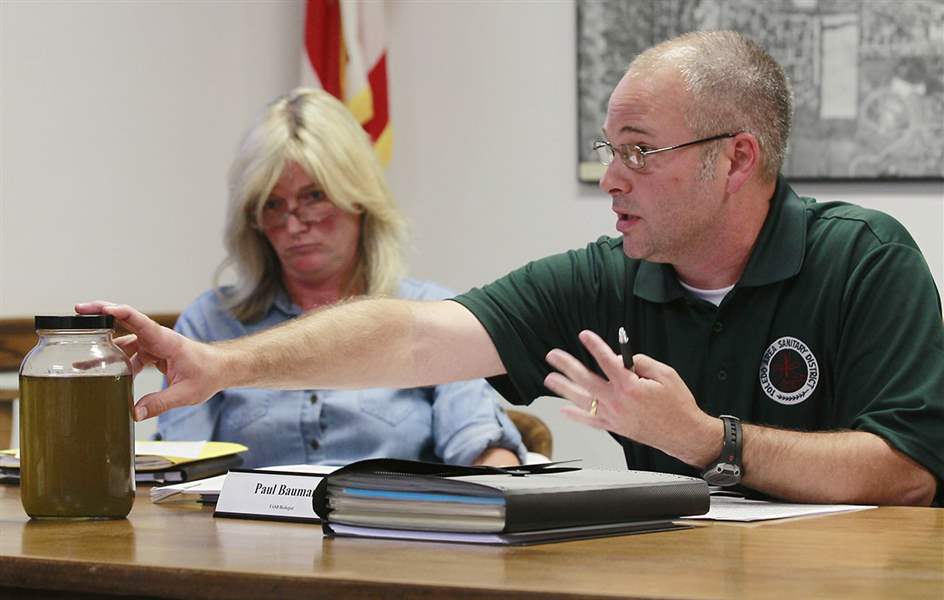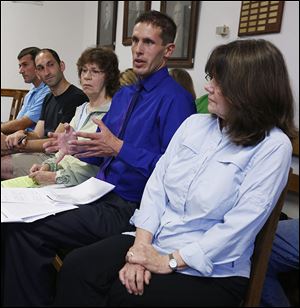
Ottawa Hills group tries to get mosquito control halted
7/31/2014
Heidi Glosser looks at a jar of water brought in by Paul Bauman of the Toledo Area Sanitary District during a Mosquito Task Force meeting in Ottawa Hills.
THE BLADE/LORI KING
Buy This Image

Heidi Glosser looks at a jar of water brought in by Paul Bauman of the Toledo Area Sanitary District during a Mosquito Task Force meeting in Ottawa Hills.
A task force of Ottawa Hills citizens and public officials who object to pesticide fogging for mosquitoes learned Wednesday that getting out of the Lucas County mosquito-control program may not be an option for the village.
The director of the Lucas County Sanitary District, Richard Cohen, told the group gathered for a meeting Tuesday night that Ohio law requires the agency to control the mosquito population. District biologist Paul Bauman said the agency uses spraying, which some in Ottawa Hills want halted, along with a larvacide program and an education program to get rid of mosquitoes.
Mr. Bauman said while some small communities in the Cleveland area have passed ordinances to stop mosquito spraying, that may not be an option in the Toledo area.
The task force met for more than two hours in what was at times a contentious meeting. About 10 spectators also filled the small meeting room in the Ottawa Hills administration building. Most of them oppose the night pesticide fogging in the village.
Ottawa Hills Village Administrator Marc Thompson said the task force was formed after a few residents complained to the council about the spraying program. Resident Matt Cooper also launched an online petition against the practice.
Mr. Cooper, who grew up in Ottawa Hillsand moved back to the village about five years ago to raise his family, said he has researched the issue and believes the chemicals in the insecticide are a more serious concern than the threat of diseases carried by mosquitoes, such as West Nile virus.
West Nile virus, which can in rare instances cause death was a primary focus of much of the discussion because the sanitary district recently discovered West Nile in mosquitoes caught in a trap in Ottawa Hills. After the district sprayed the area, he said the mosquito population declined substantially and subsequent tests of mosquitoes showed negative results for West Nile.

Guest speakers Dr. Brian Fink, second from right, and Dr. Eileen Metress, right, speak about the dangers of pesticides.
“We act as if ebola is upon us with West Nile," said Eileen Metress, professor emeritus of public health at the University of Toledo. Ms. Metress, who was invited to speak at the meeting about the dangers of chemicals and pesticide, said the concern about West Nile can be exaggerated.
She shared information from several national studies that suggest a connection between one of the primary chemicals used in the night fogging applications in Lucas County, chlorpyrifos, to neurological problems in children, including autisum and attention deficit disorder.
Toledo-Lucas County Health Commissioner Dr. David Grossman said, however, he is not convinced by the information presented because the studies did not prove the chemicals caused the problems.
“I know a lot of people would be upset if we did not spray and one of their relatives became sick,” Dr. Grossman said.
Mr. Bauman said homeowners have the right the ask the sanitary district not to spray their homes.
The task force members plan to explore their options to find a process for municipalities to end the spraying.
Contact Marlene Harris-Taylor at mtaylor@theblade.com or 419-724-6091.